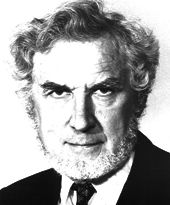Hageman Distinguished Lecturer in Agricultural Biochemistry

Dr. Eugene W. NesterDepartment of Microbiology April 15-16, 1998Lecture: "Agrobacterium: A Natural Genetic Engineer of Higher Plants" Colloquium: "Analysis and Implications of Inter-kingdom DNA Transfer" |
About the speaker
Eugene W. Nester received his B.S. degree from Cornell University and his Ph.D. from Western Reserve University and was then a postdoctoral Research Fellow in Genetics at Stanford University. He has been a faculty member at the University of Washington since 1962 and was Chairman of the Department of Microbiology from 1982 to 1997. Dr. Nester is a member of the National Academy of Sciences, a fellow of American Academy of Microbiology, the American Association for the Advancement of Science, and the National Academy of Sciences, India. He received the Australia Prize (Inaugural) in 1990 and the Cetus Award in Biotechnology in 1991. Dr. Nester's research has been recognized by several noted Honorary Lectureships. He has served on the Editorial Boards of six journals including the Journal of Bacteriology and Plasmid and was the Senior Editor of Plant-Microbe Interactions and Associate Editor of Molecular Plant Microbe Interactions. He has served on and often chaired review panels and steering committees for both national organizations and national policy making committees. Linked to his research interests, a special policy concern of his has been the consequences of introducing genetically modified microorganisms and plants into the environment.
Dr. Nester switched his research focus from the genetics and enzymology of aromatic amino acid biosynthesis in the early 1970s to the newly emerging topic of crown gall formation by members of the bacterial Genus Agrobacterium. Nester and coworkers soon discovered that the ability of the bacterium to cause plant tumorigenesis resided on a large plasmid. In 1977, a landmark paper from his laboratory established the presence of Agrobacterium plasmid DNA in the DNA of plant tumors. The ensuing characterization of the transfer of bacterial DNA to plants has continued unabated for over twenty years. The bacterial DNA was shown to be transcribed by host plants and to encode a variety of enzymes including the biosynthetic enzymes for the plant phytohormones, which, in turn, permitted the unregulated growth of the plant tumors. It was then found that the tumor-causing genes could be removed and replaced with genes of agronomic and experimental interest. This resulted in the development of methods for genetic engineering of plants. The Agrobacterium DNA transfer system has been applied in the genetic engineering of all major crop plants and shows promise for additional applications. Dr. Nester's recent research has elucidated the molecular requirements for the DNA transfer process.